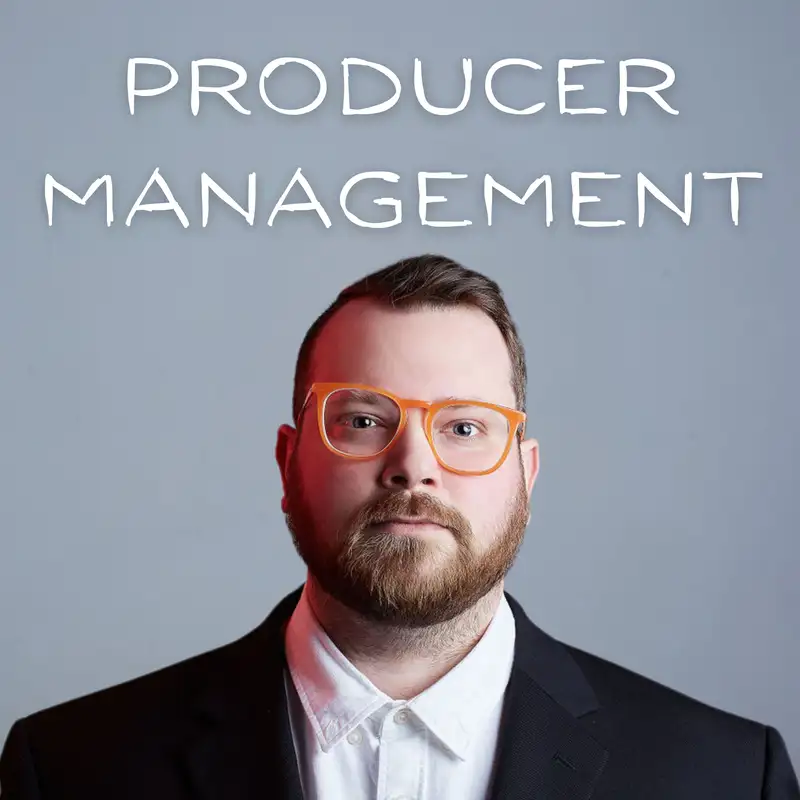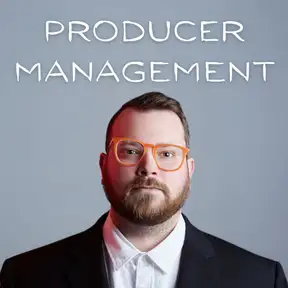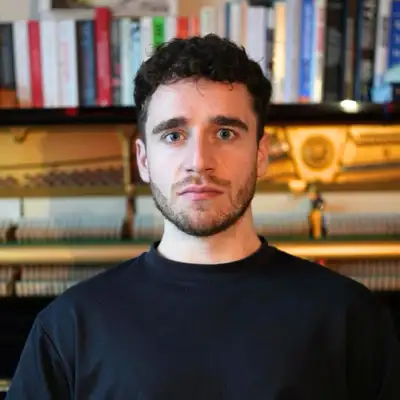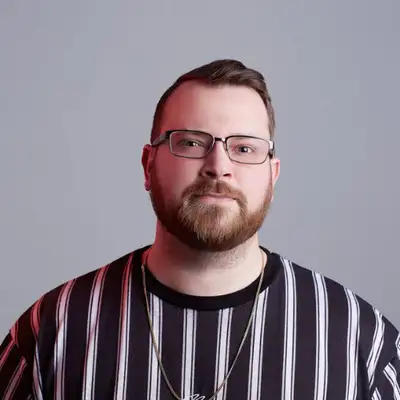
The Full-Time Producer's Identity Crisis
Year one was a lot of like, wow, this is new. This is awesome. The earlier honeymoon stage, right? There's this discovery treating our music careers and where we're at in the season of life that you're in Jay as the spring when you're in winter is what causes the biggest form of discontentment.
Hey everyone, Daniel Grimmett here. You're listening to producer management, the podcast that lets you in on real conversations between professional music producers and their teams, the deals, the strategies, and the unfiltered advice. The show is brought to you by my company, dark label music.
When producers want clarity strategy and growth, they call us. We're not a course or a coach we're hired as a strategic partner, part management, part creative and business development designed for the realities of being a music producer right now. So whether you're a small studio or a Grammy winning veteran, reach out to us at dark label, music.com to see if we can help.
Okay. So I've got a very special episode for you today. One that dives into territories that we don't often explore when I'm developing producers, a big part of my process is connecting them with people in my network who offer different angles and experiences.
I'll never claim to be the person who knows everything about everything. And I don't recommend that you do either. You as producers can apply the same approach when working with artists that you're developing.
Your competitive edge could be having a powerful network that you can tap into to help unlock new levels for the artists that you serve. So about six months ago, I connected a small group of my producers with a close friend of mine. He's a Grammy winning producer.
Who's just been in the business for over 20 years as he explored most sides of the business from the industry side to be in a YouTuber and everything in between. So his voice may sound familiar to some of you, but very interesting and knowledgeable guy. There's a ton of content online about going full time as a producer, but there's very little content talking about what happens once you're already there.
I've worked with hundreds of producers and there's a harsh truth that I see over and over again, and I need you to know this. Getting what you want can actually create new problems and sometimes cause an existential crisis. And that's exactly what this conversation explores.
I'll be jumping in with some commentary throughout. So stick around. This one's going to change how you think about success in this business.
Enjoy the episode. Hey man, uh, appreciate you being here and the honesty and vulnerability with what you're sharing too is really awesome. I'm definitely like resonating a lot with a lot of the things you're saying, especially to like about quality of life and family, um, not, not always playing the game, you know, that they tell you you have to play.
Um, that's something that I've been on a huge journey with myself. So I really appreciate you sharing that. Oh, Jay.
Thanks for listening, man. Yeah, absolutely. Um, for me, one of the biggest, uh, kind of journeys I've been on recently, um, is, so I've been full time with music for about three years now.
Um, and been doing production and mixing for about 12 and for, you know, nine of those years, the goal was like, get full time, right? Get full time and make money off of this thing. And, uh, everything I was doing was in service to that goal, right. Of like, I want to do this as a career.
And it's funny. Cause then when I transitioned over to the full time and, uh, you know, you start doing it and actually making money with it and the goal gets checked and it's like, okay, now this is what I'm doing and I'm paying my bills. But then I feel like I had so much more passion and drive to do the music when I was working three jobs and I was working 40 hours a week music right on the side.
And, uh, yeah. And so it's really interesting cause I feel like, you know, the first year was just kind of keeping my head above water. Right.
And, and making sure I was, you know, able to stay there. And then the second year was a little bit more balance and control and quality of life. And this third year has been much more quality of life.
Um, but then I feel like it's become, you know, very, like I have a lot of rhythm and I have a lot of, you know, okay, I know what I need to do to keep my business moving and all these things. But I'm really, um, looking for ways to kind of reignite that passion for what I do, because I feel like that's, you know, slowly waning and I found certain things like, you know, still taking time to make music for fun or, you know, make music with friends or this or that, but I would be curious to hear if you'd be willing to share just kind of if your journey with that, I'm assuming you resonated just by, you know, the reaction, obviously. Um, but I would love to just hear your journey with that as somebody who's much further along in that, um, you know, in that, in that scope of how long you've been doing this for and, and what that's like and, and, um, maybe some strategies or things you've found to kind of.
Kendall that passion that got you into it in the first place. You know, I'm going to pause here. It's funny timing because I'm releasing a video on the dark label YouTube channel next week.
And one of the lessons in that video is about this. So at the start, you have what I call the fire and this fire is there to kind of serve as extra adrenaline at the start of your career in order to get you over those, you know, initial hurdles, because the startup phase is probably the hardest phase to get there. Once you get over that first big hurdle as a producer and finally like make it a full-time thing.
Maybe you're not, you know, rich and famous yet, but you know, you kind of get over that first hurdle and it becomes a real, that fire typically starts to fade after that and the free freaks a lot of producers out because they think that they've, you know, just lost their motivation, but anything you accomplish in life, it eventually just becomes normal to you, right? Like what may be your biggest life goal is just someone else's normal day-to-day life. So just wanted to throw that in there. Let's keep going.
What, what an amazing, amazing insight and question. First of all, where'd, where'd Jay go? Did you? Oh, there you are. All right.
Sorry. Um, I want to say two things. Um, Daniel, is Daniel still here? I think he's up.
Well, oh, there is. Okay. Daniel, you've got a freaking awesome group of people here, bro.
These, these, these are, these are. I just texted Aaron. I was like, I'm gonna start bringing guests more often.
I get to learn what y'all's real problems are. This is awesome. So thanks for letting me be here, buddy.
Okay. Now, Jay, do you guys, do you guys just summarizing Jay's journey? Do you guys understand what he's coming from here? And there's this whole notion of like passionate ambition drive to finally make a full-time living off music. Got there.
I'm on the summit, the top of Himalayas. Then I realized somebody had a flag up here and they, they wrote their name in the snow and in yellow, and I'm like, this kind of stinks, right? So you're on the top of the mountain. You realize we're, we're that same drive and passion go for music.
It almost feels like music came, became what a job, right? And then when it becomes a job, the life is gone. So, um, surprise. Uh, this is, yeah, this is what happens.
It's happened to me, man. It's led to almost a borderline depression and, and, and almost just like all out, I don't know if I want to do this anymore kind of thing. Um, and, and, and by God's grace, I led into Beat Academy, which stoked another vigor, but even through that, and just like what he meant, creating content, I mean, I got to a point where I'm making content.
I would look at my Ableton Live cause I use Ableton Live. And I would look at my screen. I'm like, I started to gag.
I was like, I see this and I don't see music making, I see freaking editing content thing. I'm like, I, I need, this needs to stop. Like, so, um, I don't know if I have the exact prescription, Jay, for that.
Right. In the sense that the cure all for all, because I think what's intertwined with that is so much of where our identity is rooted. Okay.
Um, so just as a caveat to everybody here, please don't hear me on this and say, this is the silver bullet. That's going to kill this giant that you, you might be facing as well. You really have to tap into a lot of asking why that problem exists.
Right. So a lot of it was, you know, for me, the identity was in seeking praise. Uh, so I was trying to stay, I'm going to make this marriage analogy too.
Right. If I'm expecting year one of my marriage, like I'm, so I'm 15 years married. Right.
And if I expect my year 15 to be identical to year one, something's wrong because there's no, there's, I haven't reached a level of intimacy and depth of relationship that I am in right now in 15 that I've done in year one. I love this analogy. I think it fits this situation perfectly.
Just like with any relationship you have in your life could be best friend, family member, spouse, children, whatever. These relationships evolve over time and reach a new depth. I would find it super weird.
If you know, my dad treated me the same way now at 37 years old as he did when I was a little kid. That's two completely different times and phases of our relationship. And that's the same thing you're going to feel with your career.
It just evolves. Let's keep going. Year one was a lot of like, wow, this is new.
This is awesome. This is crazy. Or maybe the first week of dating someone, the first week of getting to know something, the first week of the earlier honeymoon stage.
There's this discovery. Okay. Well, you move past discovery and you're moving past.
Ouch. This person knows me, knows me better than anybody else. And what that does is it brings up a lot of stuff.
So there's the, there are the trenches. But then through that comes the depth of that relationship. Does that make sense? So treating our music careers and where we're at in the season of life that you're in Jay, as the spring, when you're in winter is what causes the biggest form of discontentment.
So you start on this journey. You've got this ambition. You've got this drive to go full-time.
Awesome. Check my, and by the way, Jay, congratulations, because you've accomplished something that not a lot of people have been able to do. And we sometimes think everybody's able to do that.
No dude, like that's freaking awesome. So, yeah, dude. So first off realize and have a silver assessment.
So you might not be where you want to be, but you're definitely not where you used to be. And I think that form of humility allows you to appreciate, Hey, um, yeah. So that's, that's something I had to discover, like that my year 23 is not year two for me.
Hmm. So my goal was get to the Grammys, get to the Grammys, get to the Grammys. Man, by God's grace, I got to the Grammys, nominated, bam.
And this past November, I was on a project that won a Grammy in the land Grammys. Okay. Tasted that, seen that.
And then I get there. I'm like, what's next? And I was like, ah, and so there's always a what's next, dude. That's the thing.
There's always a what's next. Well, what are some other places that really are triggering inspiration for music and what are the other aspects of it? You're not a freaking robot, Jay. You're not just going to pump out music all the time.
Are you married yet? You have married, you have kids? Uh, fiance. Yeah. Yeah.
Yeah. Okay. Well, dude, like, I don't know, go, where are you at? Where are you based out of? San Diego currently.
Okay. So I don't know, San Diego, go, go on a golf cart or ride on a, I don't know. Just go see the seals or something, you know? Like go surfing or something.
I don't know. Like being a better fiance, being a better fiance is going to make you a better producer. Let's put it that way.
A hundred percent. This is an important point. I remember when I was a teenager, my dad got me a guitar lesson, just one lesson with a kind of famous blues guitar player that was playing in town.
And the entire lesson was about when not to play a note. You know, I thought I was going to learn all this cool stuff. You know, 14 years old.
I thought he was going to teach me how to shred. The whole time was talking about when to not play notes and just the importance of space. And later on in life, when I was kind of working myself nonstop into the ground, I had a business mentor that essentially taught me the same lesson.
He told me that the space and time away from your work is just as important, if not more important than the time that you're actually working, because that's where you develop perspective. That's when ideas come up. Ideas usually don't come up when you're, you know, in the grind.
It's hard to develop that perspective when you're, you know, just going hard 24 seven. Obviously when you're starting out, you may not have that luxury, but it's just something to consider for the future. Let's keep going.
Yeah. You see what I'm saying? Yeah. Well, and that's been so much of, I think what actually threw me for a loop in a way is that I was, when I really needed music, you know, and I was like, and that drive and whatever is, I was in a really not great place in life and now my quality of life is phenomenal and I'm, you know, happy relationship, all these things.
And I feel like I'm trying to rediscover what music means to me when I don't need it. This is an interesting point. So I don't want to brush over it.
In general as humans, we tend to be more open and driven to change, to making big changes in our lives when things are not going as well as we would have hoped. Right. Uh, when you're at the bottom, there's really only one direction to go and that's up.
So making big changes, I think is actually easier despite, you know, things not going so well, but when you get to a point where you're, where you're finally stable and it feels a bit smoother, then you have to be more intentional about growth, right? Like if you've ever been in a period where things are going pretty good and. You know, maybe it's been stable for a bit. Sometimes you start feeling this discomfort and boredom and you feel like you, I need to change a bunch of stuff or whatever.
You kind of go a little crazy. I think that squirrely feeling is probably an indicator that you have some growth to do, but you haven't been motivated to do it because you know, you haven't really had to, things have been stable. So I think that's an interesting thing to consider.
Let's keep going. When I needed music to tell me who I was, it was like this everything. And I was, like you said, my whole identity is wrapped up in it.
And now I'm like rediscovering, okay, where does music fit? Like exactly what you said, which is like when my identity isn't wrapped up in it. What is music to me as just enjoying it, but then also having the work piece, I feel like is like, it just makes it tricky to figure out like, okay, where does that fit? Cause it does come from a similar energy pool a lot of the time, you know? Yeah, dude, look, strive with excellence in everything you do. So if I got a project, so I still, I still am producing records.
I'm not full on YouTube, full on Beat Academy. A, because I love doing it, but now I can be really choosy about the records I want to work on. And so, but when I have projects from like good, either record label, you know, it's like, Hey, you know, Gwen Stefani, we're working on this project again.
I was like, okay. I have like, when it comes to the major, when the industry stuff, I'm like, oh, whatever, bro. I'm not, I'm not putting my chips in that basket.
But when there's like a legit, like, Hey, this is a TV broadcast network. We want you to do some scoring and some stuff like that. I was like, great.
I want to strive with excellence with that. So continue with that drive and momentum to deliver with excellence and grow in that and do that. And that's fantastic.
Um, but yeah, I'm not the young kid who's making beats just to be able to DJ them out that evening when I'm, I'm not there. And I love that season. I'm not looking, I'm not knocking that down.
That's where it came from. And every now and then I'll pop in a bad company, you know, DJ Fabio, and I'll listen to some drum and bass. I'm like, those are good.
I want to make some drum and bass today. All right, go, go do it. Right.
So again, man, like you're in a whole new place that you're in right now, Jay. And you're going to tap into another place. That's going to inspire you to do some incredible music.
It's not that you're gone. Your muses left. It's just, it's, it's got a whole new wardrobe.
Yeah. All right. Awesome.
Thank you, man. Appreciate it. If you go to producer management.com, you'll find links to jump on our newsletter, which I highly recommend because it's the perfect companion to the show.
And if you enjoy what we're doing here, please leave us a five-star review or share it with a friend. Thanks for listening. That's the episode.


